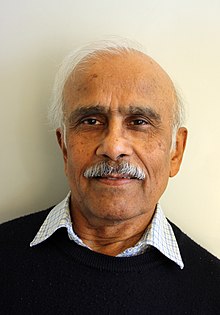Saral Sarkar
Saral Sarkar ( Bengali সরল সরকার Saral Sarakār ; born May 10, 1936 in West Bengal , India ) is a publicist and political activist . He has lived and worked in Cologne since 1982 .
Childhood and youth
Sarkar grew up in Kamrabad (West Bengal) and Calcutta (Kolkata) with five siblings. Among other things, a politically open-minded family, good school books (which, for example, addressed criticism of large estates) and a peace association "Shanti-Sansad" (with a handwritten newspaper) founded in Kamrabad in 1945 and his brother-in-law promoted his interest in politics at an early age. In West Bengal in the early 1950s, reading books on left-wing intellectuals was considered good form.
education
1958 Bachelor's degree from Calcutta University . 1959–1964 bank clerk in Calcutta. 1961–1964 training (in evening courses) as a German teacher at Max Mueller Bhavan (Goethe Institute) in Calcutta and Pune (during this time he met his wife, the sociologist Maria Mies ). 1964 and 1966 study visit to Germany (scholarship from the German government).
Act
1966–1981 lecturer at Max Mueller Bhavan in Hyderabad, India. At the request of students there, Sarkar led voluntary political working groups during this time. 1982 moved to Germany. From 1982 to 1987 Sarkar was a member of the party "The Greens", which he left because the party had abandoned its founding program in favor of participation in power. 1982–2005 participation in the ecology and peace movement. 1997 Foundation (with Maria Mies and five other friends) of the Committee Resistance Against the MAI (Multilateral Agreement on Investment), which was later renamed Network Against Corporate Rule and Neoliberal Politics. The latter later became part of ATTAC Germany. In 2003, Sarkar and Bruno Kern founded the “Eco-Socialism Initiative”, which spreads the idea of eco-socialism in German-speaking countries.
In his works, Sarkar criticizes the growth orientation that is common to the most varied of economic theories - e.g. B. (neo) classical theories, Marxism, Keynesian and Schumpeterian economic theories. Against the background of the limitation of energy and other resources as well as the manifold environmental degradation, Sarkar considers a paradigm shift to be urgently necessary - namely from the growth paradigm that is still prevalent today to one that he calls the "limits-of-growth paradigm". According to Sarkar, the current economic crisis is not simply a crisis, let alone the crisis of capitalism, but that of industrialism in general. Sarkar's vision of a good and sustainable society and economy is an eco-socialist one.
Publications (selection)
- "Green-alternative Politics in West Germany". Volume I .: The New Social Movements, 1993; Volume II .: The Greens, 1994; Tokyo, New Delhi. United Nations University Press.
- "Eco-Socialism or Eco-Capitalism? - A Critical Analysis of Humanity's Fundamental Choices “, 1999, London, New Delhi. Zed Books et al. Orient Longman.
- "The Sustainable Society - A Critical Analysis of System Alternatives", 2001, Zurich a. Saarbrücken. Rotpunktverlag u. Southwest German publisher for university publications. (Revised and expanded translation of No. 2).
- “Eco-socialism or barbarism” (with Bruno Kern), 2004, Mainz and Cologne. Eco-socialism initiative.
- “The Crises of Capitalism - Another Study of Political Economy”, 2009 a. 2010, Cologne / Mainz and Neu-Ulm. Initiative eco-socialism u. AG-SPAK books.
- “Understanding the current global economic crisis”, 2012, Mainz. Eco-socialism initiative.
- "The Crises of Capitalism - A Different Study of Political Economy", 2012, Berkeley, USA. Counterpoint. (Revised and expanded translation of No. 5).
Sarkar has also published numerous essays and articles in various European, North American, Chinese and Indian newspapers and magazines - in English, German, Chinese and Spanish.
Web links
- Eco-socialism initiative: http://www.oekosozialismus.net/
- Sarkar's blogs: ak-oekopolitik.blogspot.com and http://eco-socialist.blogspot.com/
Individual evidence
- ↑ Personal communications, Feb. 6, 2013, Cologne
- ↑ MIES, Maria u. WERLHOF Claudia von (1998): License to plunder. The Multilateral Agreement on Investment MAI. Globalization of corporate domination - and what we can do about it. Hamburg
- ^ Initiative eco-socialism: www.oekosozialismus.net
- ↑ SARKAR, Saral (2001): The sustainable society - A critical analysis of system alternatives. Zurich u. Saarbrücken
- ↑ SARKAR, Saral (2012): Understanding the current global economic crisis. Mainz, p. 12
- ↑ SARKAR, Saral (2012): Understanding the current global economic crisis. Mainz, p. 30
- ↑ KERN, Bruno u. SARKAR, Saral (2004): Eco-socialism or barbarism. Mainz and Cologne
| personal data | |
|---|---|
| SURNAME | Sarkar, Saral |
| ALTERNATIVE NAMES | সরকার, সরল (Bengali) |
| BRIEF DESCRIPTION | Indian publicist and activist |
| DATE OF BIRTH | May 10, 1936 |
| PLACE OF BIRTH | West Bengal , India |
